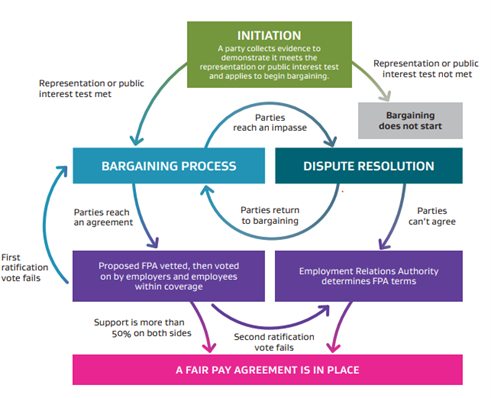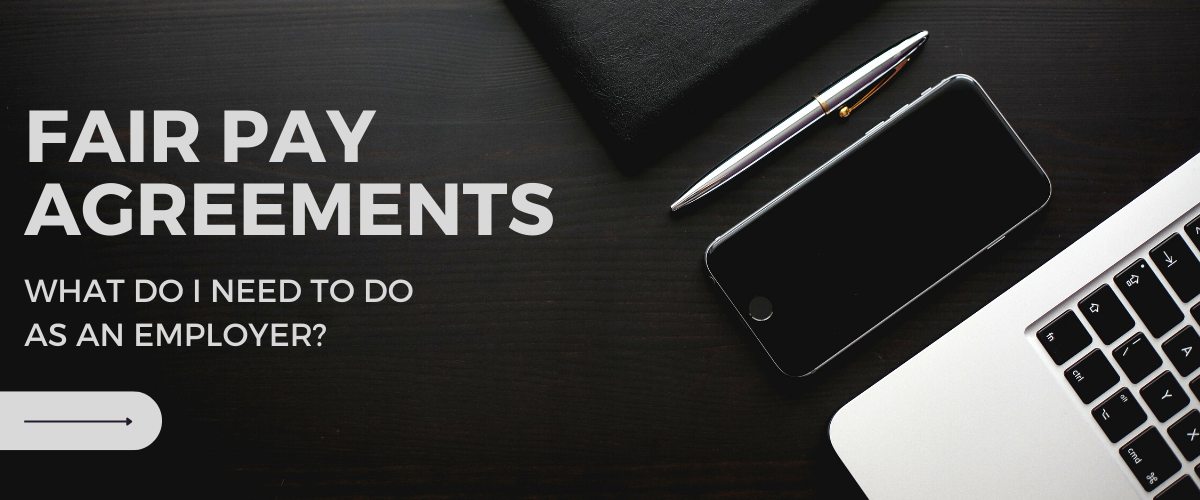We’ve put together, in plain English, a summary of how the Fair Payment Agreement Act will affect your business.
What is a fair pay agreement? (FPA)
The government is bringing in a new Fair Pay Agreement system, where employer/employee associations and unions will bargain for minimum employment terms across an occupation or industry. These organisations will meet to discuss and agree on a set of employment terms for the work being done within that specific occupation or industry.
What stage is the fair pay agreement bill at?
The Fair Pay Agreement Act has now been passed in parliament, and applications to initiate bargaining are available from today, 1 December 2022. If you would like to apply to start the bargaining process, you can read about this and find a copy of the application form here.
Who will the fair pay agreements affect?
Both employers and employees where the bargaining process has happened, and a FPA has become law in that specific occupation or industry.
Will my business need to bring in the fair pay agreements?
Yes, if any of your employees meet the work threshold to be covered by the FPA, you would need to provide the minimum terms set out in the agreement to those employees. For example, if you employ a cleaner and an FPA becomes law for cleaners (as an occupational-based FPA), then this agreement and its terms would need to be applied to the relevant employee(s). Some other important points:
- Your employee will meet the work threshold if the Fair Pay Agreement covers the type of work they do and the agreement covers 25% or more of their work.
- For employment agreements, if a term in the Individual Employment Agreement is better than what is in the Fair Pay Agreement, then the better term out of the two will apply.
You can read more about this here.
What terms must be included in a fair pay agreement?
A Fair Pay Agreement must include the following details:
- What work is covered by the agreement
- The date the agreement comes into force
- Standard Hours
- Minimum pay rates (including overtime etc)
- Training & Development
- Employees leave entitlements
- How long the Fair Pay Agreement applies for
What if I do nothing as an employer?
An employer that fails to comply with an FPA once this has become law can get the following penalties:
a. Not exceeding $10,000 if the person is an individual
b. Not exceeding $20,000 in the case of any other person
How will the bargaining process work?
Bargaining for a Fair Pay Agreement will involve both an employer and employee bargaining side. You can view more about who can be included in the bargaining parties here.

Step 1 – An eligible union will start the application process by applying to MBIE for approval to start bargaining (referred to as the initiating union). The initiating union must provide evidence that they are an eligible union and show they meet either a representation test and/or a public interest test. From here, the Chief Executive of MBIE may invite public submissions depending on the evidence and test included as part of the application process. You can read more about this and the representation/public interest tests here.
Step 2 – Once the union’s application to initiate bargaining has been approved, other eligible unions and employer associations can apply to become an employer bargaining party. Applications need to be made in writing on the MBIE form, and anyone on the employer bargaining side must also provide evidence that they are eligible to apply.
Step 3 – Each bargaining side will negotiate the terms of the Fair Pay Agreement until an agreement is reached. During the process, employees will get updates from the employer bargaining party unless they choose not to. An employer and employee will have rights as part of this process which you can read about here:
Step 4 – When the bargaining parties have both agreed to the terms of the proposed fair pay agreement, to become law, it must be:
- Assessed by the Employment Relations Authority to confirm the agreement complies with the law
- Voted on by covered employees and employers (called ratification)
- Assessed so the process and results from the vote can be verified by the Chief Executive of MBIE
- Made into law by MBIE
Step 5 – Once this is made into law, any employees that meet the work threshold to be covered by the Fair Pay Agreement must be covered by the minimum employment terms set out in the agreement.
In this link you can also read:
- How the fair pay agreements work with other employment agreements
- What happens when bargaining sides cannot reach an agreement.
- What happens if no party comes forward to bargain on one side.
Some extra points
- Once the initiating union’s application to initiate bargaining has been approved, bargaining sides must be formed within three months of the approval date.
- The minister of workplace relations has signaled that Bus Drivers, Cleaners, Supermarket Workers and Security Guards are examples of sectors that require priority for a FPA. (within 1-2 years)
- The terms of an FPA will be location-based i.e Employees in Christchurch will have lower minimum pay rate terms than employees in Auckland, due to them having different living costs.
- The Ministry of Business, Innovation and Employment (MBIE) have put together a range of services to help support bargaining parties during the bargaining process. You can read more about this here.
The Fair Payment Agreement Act is currently quite complex and open to interpretation. Some details are not defined. We will keep you updated as more information is released.
Parting message – How do we, as employers, have a say, and how should we prepare
- Look at your employee’s roles within your business eg cleaner, welder, administrator etc. Be clear on their occupation and what industry they will fall under.
- Be involved with your industry and occupations upfront in the nationwide bargaining process before an FPA is determined. (to help bargain your desired terms).
- Stay involved with your industry association – they will likely keep you up to date if an application for bargaining has been approved, and hopefully you will be able to have some input through them (especially if you don’t have the resources available to be part of the bargaining process)
